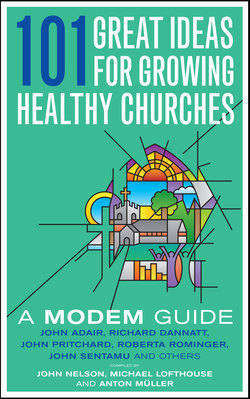Читать книгу 101 Great Ideas for Growing Healthy Churches - John Nelson - Страница 28
На сайте Литреса книга снята с продажи.
ОглавлениеGreat Idea 18: Be Mindful of Management
PETER RUDGE
Let us make people in our image to be like ourselves.
They will be master over all life
Genesis 1.26
Top Tip: Learn from the history of management and choose wisely.
Business Perspective: Successful business managers understand that there is no single management style and that there is the opportunity to draw from a variety of management styles. They realize that there is a wealth of management knowledge to be discovered through historical and academic study which allows the manager to situationally select the most appropriate management approach.
The body of knowledge commonly known as management first appeared during the 800-year period following the time of St Thomas Aquinas, c 1226–74, a Dominican monk canonized in 1323, who argued that reason and faith were compatible. Its place in that phase is a way of indicating its character. The period was marked by a rebellion against or a rejection of theology or even an entire disregard of it.
One of the first to break the chain of the ties of scholasticism was Machiavelli in the field of politics. The next was Galileo in relation to astronomy; the contention between him and the Church is widely known; so is the instance of Darwin in the field of life sciences. Others grew up unnoticed by the Church such as Descartes in philosophy; so too were such subjects as economics, psychology and sociology. Alongside these was management.
It emerged as a sequel to the Industrial Revolution in the eighteenth century, though under the name of Onward Industry. Management writers Mooney and Reilly have traced the awareness of management to preceding centuries in the military and to preceding millennia to the building of the pyramids. It grew up without any reference to theology though the Church occasionally expressed reservations about the nature of the new society. Witness the hymn ‘Jerusalem’ and its reference to ‘those dark satanic mills’; and there were the Tolpuddle Martyrs too.
Nor did the Church lay claim to management or to any of the other subjects that arose in this phase of history. The Roman Catholic Church in 1870 in the first Vatican Council echoed the voices of all the churches in defining its area of interest as ‘matters of faith and morals’. That was all it had left from the time when theology was the queen of the sciences at the time of Aquinas. Since then its range has diminished to matters of sex and reproduction. Hence the Church of today has no claim to or interest in matters of management.
There was a further factor which closed out any interest in the subject. The view of management at the time of the Industrial Revolution became deeply ingrained in people’s understanding, so much so that the prevailing view of management came to be called the classical form of management. Another title according to the social scientist Weber was the bureaucratic form; while a term such as mechanistic was also used to reveal even more clearly the precise nature of what was conceived as management.
This view of management became so ingrained in the unconscious memory of the whole population and not just the scholars that even the most removed from the field had absorbed its universal qualities and used this form of control without even recognizing its source or character.
Anybody who wanted to manage anything was innately equipped with a never-failing source of guidance that was in the Church also. Church leaders along with everyone else expressed in their actions this innate awareness of the way to go. Some who became aware of its harshness took up an alternative and opposite line through the human relations approach which is considered to be a much more humane way. But still the mechanistic view remained hidden, but often operative, in spite of the apparent gloss on the human relations side. It’s no wonder that the Church has seen no need for any reliance on management. It was innately there.
For reflection and discussion
1 What is your understanding of the word management?
2 What value is there in exploring the range of management styles that have come down to us through history?
3 What aspects of management do you think could be of most benefit in growing healthy churches?
4 What aspects of management do you feel have no place in the church?
